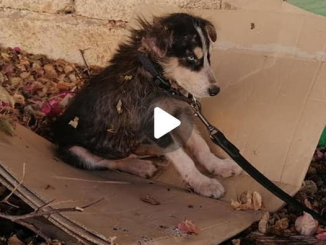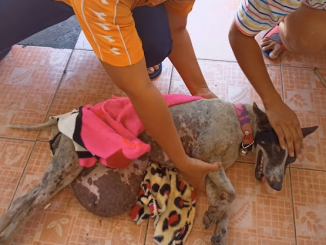Dogs’ brains are sensitive to the familiar high-pitched “cute” voice tone that adult humans, especially women, use to talk to babies, according to a new study.
The research, published recently in the journal Communications Biology, found “exciting similarities” between infant and dog brains during the processing of speech with such a high-pitched tone feature.
Humans tend to speak with a specific speech style characterised by exaggerated prosody, or patterns of stress and intonation in a language, when communicating with individuals having limited language competence.
Such speech has previously been found to be very important for the healthy cognitive, social and language development of children, who are also tuned to such a high-pitched voice.
But researchers, including those from the Eötvös Loránd University in Hungary, hoped to assess whether dog brains are also sensitive to this way of communication.
In the study, conscious family dogs were made to listen to dog, infant and adult-directed speech recorded from 12 women and men in real-life interactions.
As the dogs listened, their brain activities were measured using a functional magnetic resonance imaging (fMRI) scan.
The study found the sound-processing regions of the dogs’ brains responded more to dog- and infant-directed than adult-directed speech.
This marked the first neurological evidence that dog brains are tuned to speech directed specifically at them.
“Studying how dog brains process dog-directed speech is exciting, because it can help us understand how exaggerated prosody contributes to efficient speech processing in a nonhuman species skilled at relying on different speech cues,” explained Anna Gergely, co-first author of the study.
Scientists also found dog- and infant-directed speech sensitivity of dog brains was more pronounced when the speakers were women, and was affected by voice pitch and its variation.
These findings suggest the way we speak to dogs matters, and that their brain is specifically sensitive to the higher-pitched voice tone typical to the female voice.
“Remarkably, the voice tone patterns characterizing women’s dog-directed speech are not typically used in dog-dog communication – our results may thus serve evidence for a neural preference that dogs developed during their domestication,” said Anna Gábor, co-first author of the study.
“Dog brains’ increased sensitivity to dog-directed speech spoken by women specifically may be due to the fact that women more often speak to dogs with exaggerated prosody than men,” Dr Gabor said.

Today is my birthday They said I’ll get no like because I am ugly is that true
Comfortable birthday! 🎉🎂 Your price and worth should not decided by your bodily look. You might be distinctive and particular simply as you might be, and your magnificence comes from inside. Folks’s opinions about your look shouldn’t outline your self-worth. Deal with the qualities that make you a form, caring, and great particular person. Embrace your uniqueness and rejoice the day in a manner that makes you content, surrounded by those that admire and love you for who you might be. Keep in mind, true magnificence shines from the within out, and you might be deserving of all of the love and happiness in your big day.




Leave a Reply